Did you know that pimento peppers are 40 times milder than jalapeños? These sweet and versatile peppers are not only a colorful addition to your dishes but also pack a flavorful punch without the heat. Whether you’re a fan of Mediterranean cuisine or looking to spice up your recipes, pimento peppers are a must-try ingredient. From stuffed peppers to pimento cheese, these vibrant peppers can elevate your cooking to new heights.
Key Takeaways:
- Pimento peppers are 40 times milder than jalapeños, making them perfect for those who prefer a mild heat.
- These sweet peppers are widely used in Mediterranean cuisine, particularly in Spanish and American dishes.
- Pimento peppers can be stuffed, roasted, or used as a garnish to add flavor and visual appeal to your cooking.
- They offer several health benefits, including being low in calories and a good source of vitamins A and C.
- You can find pimento peppers jarred or fresh at grocery stores or specialty markets, or grow them at home.
What are Pimento Peppers?
Pimento peppers, also known as pimientos or cherry peppers, are sweet peppers with a mild heat. These vibrant red peppers are characterized by their round, heart-shaped fruit, making them visually appealing and versatile for culinary use.
Typically measuring about 3 to 4 inches in length and 2 to 3 inches in width, pimento peppers have a short, thick green stem that adds a touch of freshness to their appearance. With their distinctive shape and vibrant color, they are not only delightful to look at but also add an enticing pop of flavor to any dish.
Pimento peppers are commonly used in Mediterranean cuisine, particularly in Spain and the United States. They provide a subtle spiciness that enhances the flavor profile of various dishes, contributing to the richness of the overall culinary experience.
Cooking with Pimento Peppers
Pimento peppers are a fantastic ingredient that can elevate the flavor of any dish. Their versatility makes them a valuable addition to various cuisines and recipes. Whether you’re a seasoned chef or a home cook, the mild and sweet taste of pimento peppers can enhance your culinary creations in numerous ways.
When it comes to using pimento peppers in your cooking, the options are endless. Here are some ideas to help you get started:
1. Diced and Stuffed into Olives
Add a burst of flavor to your favorite Spanish or Manzanilla olives by finely dicing pimento peppers and stuffing them inside. The combination of the sweet pimentos and the briny olives creates a delightful appetizer or garnish for martinis and cocktails.
2. Mexican Fare, Chilis, and Soups
Incorporate pimento peppers into your Mexican-inspired dishes, including tacos, enchiladas, and salsas. These peppers add a subtle heat and a touch of sweetness that complements the spices and flavors of traditional Mexican cuisine. You can also throw some pimento peppers into hearty chilis and soups to enhance the depth of flavors.
3. Pasta and Risotto
Add some pizzazz to your pasta and risotto dishes by including pimento peppers. Whether you’re making a creamy Alfredo pasta or a flavorful tomato-based sauce, the mild and sweet notes of pimento peppers will elevate the taste and make your dish stand out.
4. Pimento Cheese
One of the most popular uses of pimento peppers is in the famous Southern spread, pimento cheese. Made with a combination of cream cheese, cheddar cheese, garlic, and of course, pimento peppers, this spread is perfect for sandwiches, crackers, or as a dip for vegetables.
“Pimento peppers add a mild and sweet flavor profile that perfectly complements a wide range of dishes. From stuffed olives to creamy pimento cheese, these versatile peppers can take your cooking to a whole new level.”
As you experiment with pimento peppers, you’ll discover countless other recipes and creative ways to incorporate them into your cooking. Now that you have a taste of their versatility in various cuisines, let your imagination run wild in the kitchen!
| Pimento Pepper Recipe Ideas | Description |
|---|---|
| Diced and Stuffed Olives | Finely dice pimento peppers and stuff them into Spanish or Manzanilla olives for a flavorful garnish or appetizer. |
| Mexican Fare, Chilis, and Soups | Add pimento peppers to your favorite Mexican dishes, chilis, and soups to enhance flavors. |
| Pasta and Risotto | Incorporate pimento peppers into pasta sauces and risotto recipes for a unique twist. |
| Pimento Cheese | Combine pimento peppers with cream cheese, cheddar, and garlic for a delicious spread. |
Health Benefits of Pimento Peppers
Pimento peppers offer a range of health benefits that make them a valuable addition to your diet. Not only are they delicious, but they are also low in calories and fat, making them an excellent choice for those looking to maintain a healthy lifestyle.
One of the significant health benefits of pimento peppers is their high vitamin content. They are a good source of both vitamins A and C, which are essential for maintaining a strong immune system and overall good health. Vitamin A promotes healthy vision, while vitamin C is known for its antioxidant properties and its role in collagen production.
In addition to their vitamin content, pimento peppers are rich in antioxidants. These powerful compounds help protect the body from free radicals, which can damage cells and contribute to various diseases. Antioxidants play a key role in reducing inflammation and promoting overall well-being.
Pimento peppers also contain capsaicin, a compound that gives them their mild heat. Capsaicin has been shown to aid in digestion by stimulating the production of digestive enzymes. It can also boost metabolism, helping to burn calories and promote weight loss.
To summarize, here are the key health benefits of pimento peppers:
- Low in calories and fat
- Good source of vitamins A and C
- Rich in antioxidants
- Potential anti-inflammatory properties
- May aid in digestion
- Can boost metabolism
So go ahead and add some pimento peppers to your next meal. Not only will they provide a burst of flavor, but they will also contribute to your overall health and well-being!
Tasty Pimento Pepper Recipe:
If you’re looking for a delicious way to enjoy the health benefits of pimento peppers, try this simple and flavorful recipe:
Roasted Pimento Pepper and Feta Salad
Ingredients:
- 4 pimento peppers, roasted and sliced
- 1 cup cherry tomatoes, halved
- 1/2 cup crumbled feta cheese
- 1/4 cup sliced red onion
- 2 tablespoons extra-virgin olive oil
- 1 tablespoon balsamic vinegar
- Salt and pepper to taste
Instructions:
- In a large bowl, combine the sliced roasted pimento peppers, cherry tomatoes, feta cheese, and red onion.
- In a small bowl, whisk together the olive oil, balsamic vinegar, salt, and pepper.
- Pour the dressing over the salad and toss to combine.
- Let the salad sit for at least 10 minutes to allow the flavors to meld together.
- Serve and enjoy!
For an extra touch of flavor, you can sprinkle some fresh herbs, such as basil or oregano, on top of the salad. This refreshing and colorful dish makes a perfect side or light meal, showcasing the natural goodness of pimento peppers.
| Nutrition Facts (1 pimento pepper, approximately 28g) | Amount Per Serving |
|---|---|
| Calories | 9 |
| Total Fat | 0g |
| Saturated Fat | 0g |
| Cholesterol | 0mg |
| Sodium | 0mg |
| Total Carbohydrate | 2g |
| Dietary Fiber | 0g |
| Total Sugars | 1g |
| Protein | 0g |
How to Roast Pimento Peppers
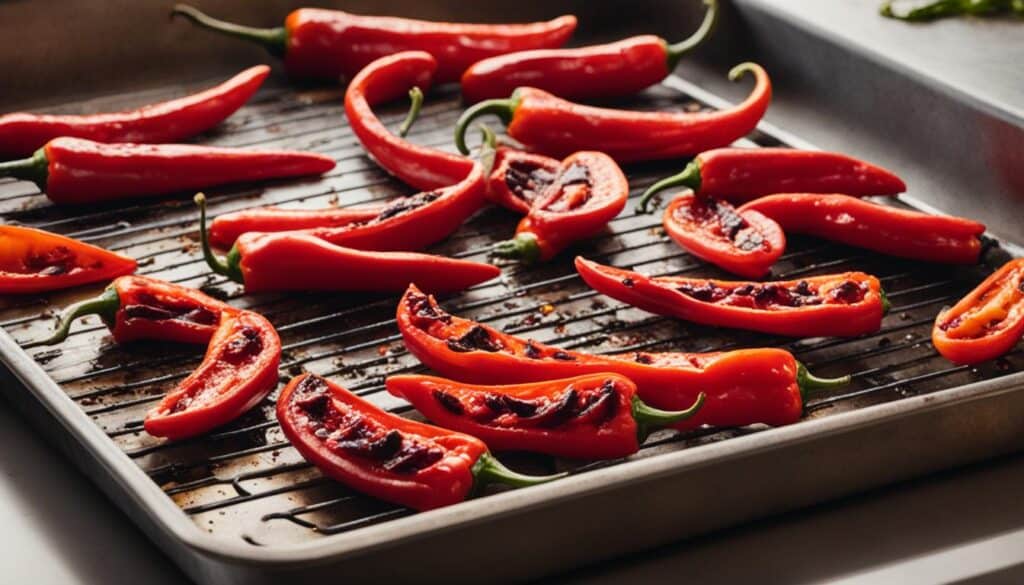
Roasting pimento peppers is a simple and effective way to enhance their flavor. Follow these easy steps to roast your own pimento peppers:
- Preheat the oven to 400°F (200°C).
- Wash the pimento peppers and remove the seeds and membranes.
- Place the peppers on a baking sheet.
- Drizzle the peppers with olive oil.
- Sprinkle salt over the peppers.
- Bake the peppers for 20-25 minutes, until the skins are blistered and charred.
Once the pimento peppers are roasted, you can peel off the skins and use them in a variety of recipes. The roasting process intensifies their sweetness and adds a smoky flavor. Enjoy the delicious taste of roasted pimento peppers in your favorite dishes!
Roasted Pimento Pepper Recipe
If you need inspiration for using your roasted pimento peppers, try this flavorful recipe:
Roasted Pimento Pepper Pasta
Ingredients:
- Roasted pimento peppers
- Cooked pasta
- Olive oil
- Garlic, minced
- Fresh basil, chopped
- Grated Parmesan cheese
- Salt and pepper
Instructions:
- Heat olive oil in a pan over medium heat.
- Add minced garlic and cook until fragrant.
- Chop the roasted pimento peppers and add them to the pan.
- Sauté for a few minutes.
- Add cooked pasta to the pan and toss to coat.
- Season with salt and pepper to taste.
- Remove from heat and sprinkle with fresh basil and grated Parmesan cheese.
Serve hot and enjoy!
| Benefits of Roasting Pimento Peppers |
|---|
| Enhances flavor |
| Intensifies sweetness |
| Adds a smoky taste |
| Enriches the texture |
Ways to Use Roasted Pimento Peppers
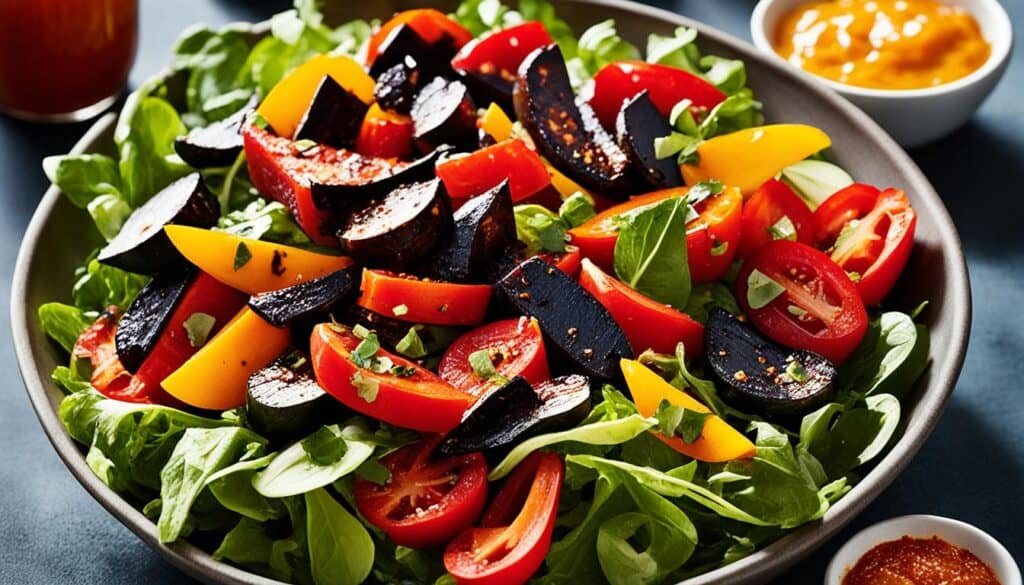
Roasted pimento peppers are a versatile ingredient that can elevate the flavors of various dishes. Here are three delicious ways to incorporate them into your recipes:
1. Stuffed Pimento Peppers
Create a mouthwatering meal by stuffing roasted pimento peppers with a savory mixture of rice, vegetables, and cheese. The smoky sweetness of the peppers complements the flavorful filling, resulting in a delectable dish. Whether you opt for a vegetarian or meat-based stuffing, stuffed pimento peppers are sure to impress.
2. Pimento Cheese Spread
Blend roasted pimento peppers with cream cheese, cheddar, and garlic to create a delightful spread known as pimento cheese. This versatile concoction can be spread on sandwiches, used as a dip for crackers, or even incorporated into deviled eggs for a unique twist. The creamy texture and tangy flavor of pimento cheese will leave your taste buds craving more.
3. Add to Salads, Pastas, and Pizzas
Chopped roasted pimento peppers can serve as a delightful addition to salads, pasta dishes, and pizzas. The smoky and slightly spicy notes of the peppers provide a unique depth of flavor to these dishes. Consider sprinkling them over your favorite salads for an extra burst of taste, mixing them into pasta for added richness, or using them as a topping on pizzas to bring a delightful sweetness to each bite.
Where to Buy Pimento Peppers

If you’re looking to add some pimento peppers to your recipes, you have a few options for purchasing them.
1. Grocery Stores:
You can find jarred pimento peppers in most grocery stores. They are typically located near the olives and pickles aisle. Check the condiment or canned vegetable section of your local supermarket to find them.
2. Specialty Produce Markets:
If you prefer fresh pimento peppers, you can visit specialty produce markets in your area. These markets often carry a wide variety of fresh and unique ingredients, including pimento peppers. You may also find them displayed on self-serve olive bars.
3. Garden Stores or Online:
If you have a green thumb and enjoy growing your own produce, you can purchase pimento pepper seeds or plants from garden stores or online. This allows you to have a fresh supply of pimento peppers whenever you need them.
No matter which option you choose, you’ll be able to find pimento peppers to elevate your culinary creations.
Tips for Storing Pimento Peppers
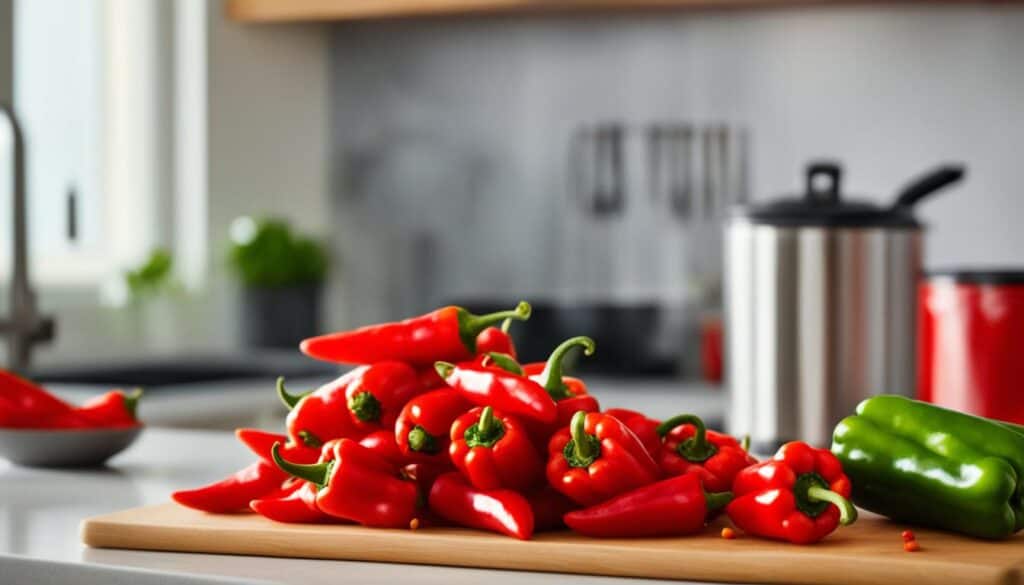
When it comes to storing pimento peppers, proper preservation ensures their freshness and flavor are maintained. Whether you have leftover pimentos from a recipe or want to stock up on these delicious peppers, here are some tips to help you store them effectively.
Refrigeration:
If you have pimento peppers that you plan on using within a week, refrigeration is a convenient option. Simply place the peppers in an airtight container to prevent them from picking up any odors from other foods. This will help retain their flavor and texture until you’re ready to use them.
Freezing:
If you want to store pimento peppers for a longer period, freezing is the way to go. Follow these simple steps to freeze your pimentos:
- Wash and dry the pimento peppers thoroughly.
- Decide whether you want to slice, dice, or keep them whole. Choose a size that suits your recipe needs.
- Place the prepared pimento peppers in a freezer-safe bag or container, ensuring they are properly sealed to prevent freezer burn.
- Label the bag or container with the date of freezing for easy reference.
By freezing pimento peppers, you can extend their shelf life for up to six months, allowing you to enjoy their delicious flavor even when they’re out of season.
Remember, properly stored pimento peppers not only retain their quality but also bring a burst of flavor to your favorite dishes whenever you need them.
Growing Pimento Peppers at Home
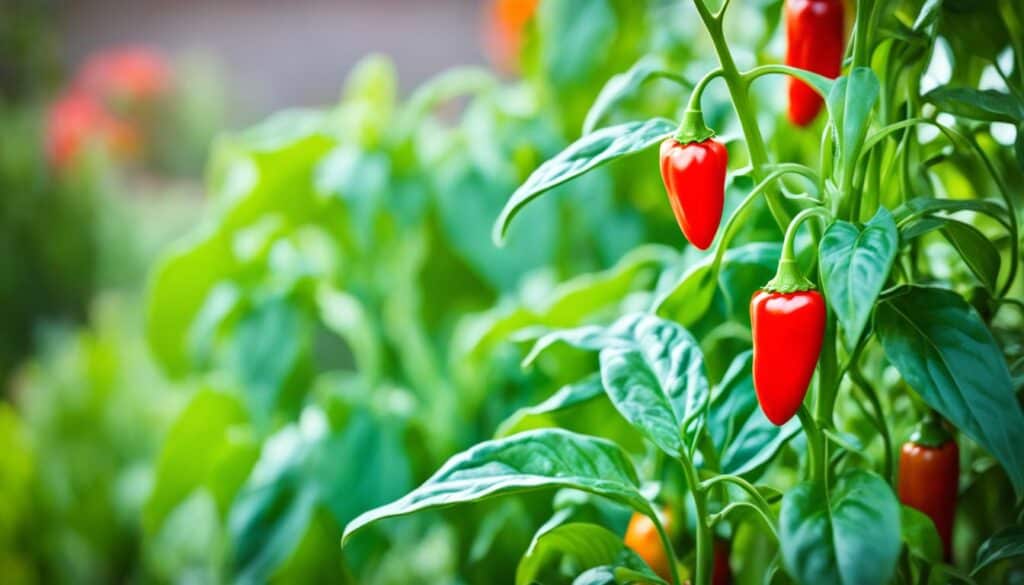
If you’re a home gardening enthusiast looking to add a unique pepper variety to your garden, why not consider growing pimento peppers? While they require a longer growing cycle compared to some other peppers, the flavorful rewards are well worth the wait. Pimento peppers are known for their sweet taste and mild heat, making them a versatile choice for a range of dishes.
To successfully grow pimento peppers at home, there are a few key factors to consider. These peppers thrive best in climates that are conducive to outdoor growing, preferably with a sunny south- or west-facing location. Pimento peppers require ample sunlight to develop their vibrant red color and rich flavor. Additionally, they need a consistent supply of water to ensure proper growth and fruit development.
When it comes to harvesting, pimento peppers are typically ready in late summer to early fall. You’ll know they’re ripe when they have reached their shiny red color and are firm to the touch. It’s important to harvest pimento peppers at the right time to ensure optimal flavor and texture.
Home gardeners can also take advantage of the versatility of pimento peppers beyond the fresh produce stage. Once harvested, you can dry the peppers and grind them into your own homemade paprika. This adds a distinct flavor to your culinary creations and allows you to enjoy the unique taste of your homegrown pimento peppers throughout the year.
Conclusion
Pimento peppers are a versatile ingredient that can add a sweet and mildly spicy flavor to a wide range of dishes. Whether you’re making stuffed peppers, pimento cheese, or looking for a unique topping for pizzas, these flavorful peppers are sure to elevate the taste of your culinary creations.
You can easily find pimento peppers in grocery stores, either jarred or fresh, or you can explore specialty markets for more varieties. If you have a green thumb, you can even grow pimento peppers at home and enjoy the satisfaction of using homegrown produce in your cooking.
Don’t be afraid to experiment with pimento peppers in your recipes. Their unique combination of sweetness and mild heat can bring a delightful twist to your favorite dishes, allowing you to explore new and exciting flavors. So go ahead, unleash your culinary creativity, and let pimento peppers add a burst of flavor to your next meal!

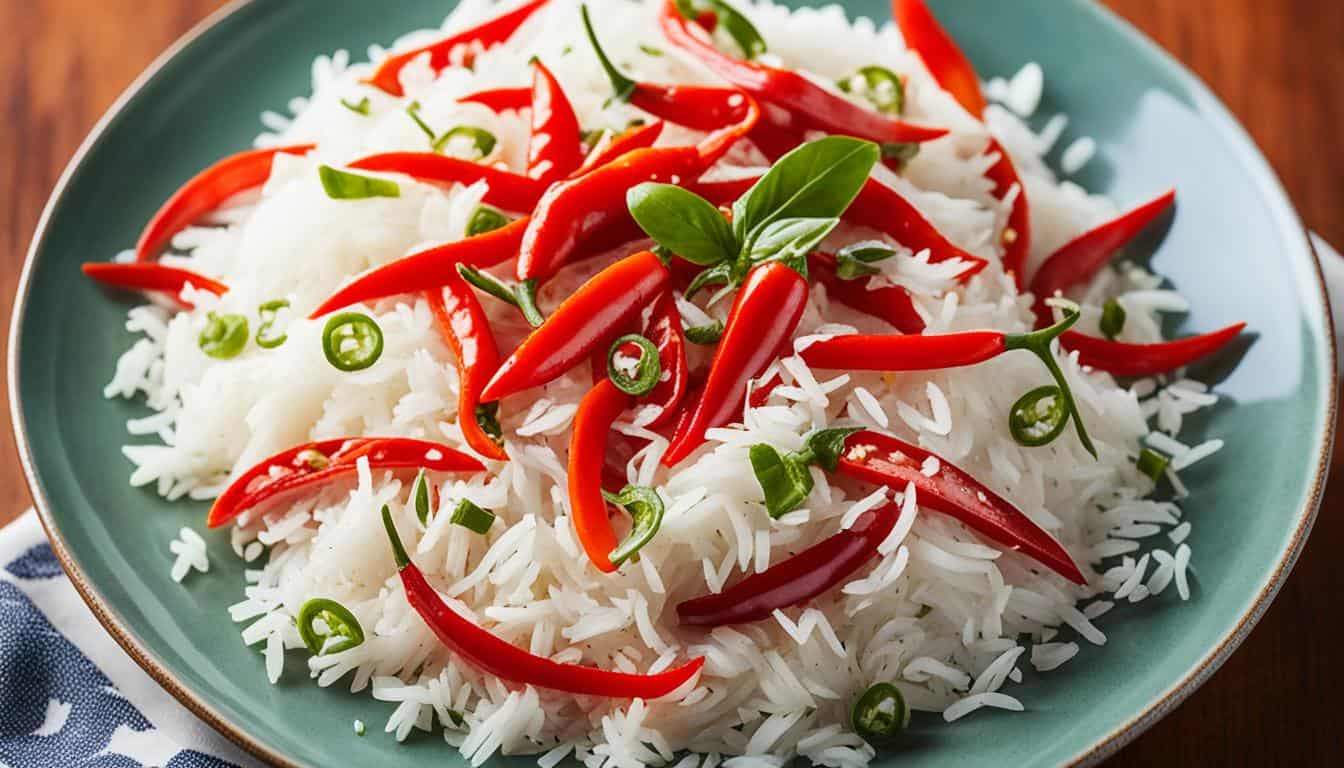



Leave a Reply